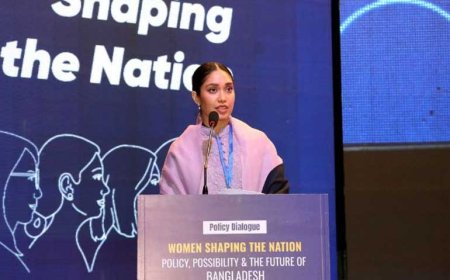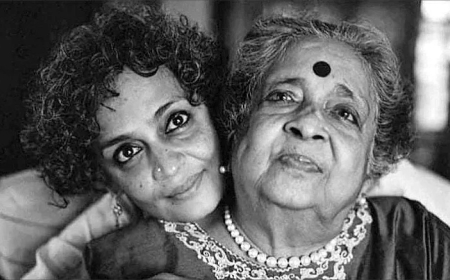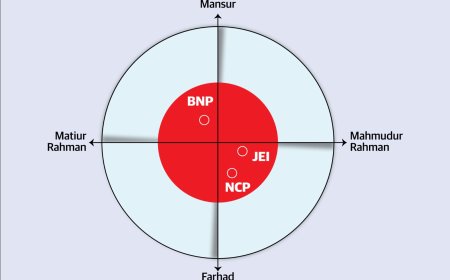Why NCP Didn’t Sign the July Charter
NCP’s hesitation is an act of political commitment to the people of Bangladesh. It seeks to ensure that Bangladesh’s long-awaited democratic transformation is not undone by legal fragility or political opportunism.

The July Revolution of 2024 was not merely a political upheaval; it was a moral and constitutional awakening. It reasserted the people’s sovereign will to dismantle Bangladesh’s long-entrenched authoritarian order and to rebuild the Republic on the foundations of democracy, accountability, and justice. The July Charter, which emerged from that uprising, promised to translate this spirit into a binding political compact.
Yet the National Citizens Party (NCP) has so far refrained from signing the July Charter -- and for good reason.
The decision is not an act of defiance, but of constitutional prudence. NCP has made it clear that it will sign only after reviewing the full text of the July Charter Implementation Order and the method of implementation. For NCP, the Charter is not a symbolic gesture or a rhetorical truce among parties -- it is a foundational document that must give birth to a new democratic order.
A Matter of Constitutional Foundations
For over a year, political parties worked with the Consensus Commission to negotiate both the Charter and its roadmap for implementation. They collectively agreed that the Charter would be realized through a three-step process:
July Charter Order → Referendum → Constituent Parliament with dual mandate—a Parliament empowered not only to legislate but to amend the Constitution fundamentally
However, the final text of the Charter omits this agreed-upon procedure. That omission is not a technical oversight -- it is a fatal flaw. To sign a Charter without specifying how it will be implemented would, in NCP’s view, amount to deceiving the people. Bangladesh’s history is replete with broken promises and shelved commissions. The nation cannot afford another hollow accord.
NCP has therefore placed three public-interest preconditions before putting pen to paper:
The full text of the July Charter Implementation Order and the referendum question must be finalized and made public.
The Implementation Order must be issued by Chief Advisor Dr. Muhammad Yunus, representing the sovereign will of the people, not merely the decree of an interim administration.
Once the Charter is endorsed by a popular referendum, any note of dissent from political actors will lose legal effect, and the next elected Parliament -- vested with constituent power -- will promulgate a new Constitution titled “The Constitution of Bangladesh, 2026.”
Why a New Constitutional Order Matters
The Charter envisages far-reaching changes to the state’s structure: four new fundamental principles, executive term limits, High Court benches in every division, and a bicameral legislature to replace the current unicameral one. These reforms, however progressive, alter the basic structure of the 1972 Constitution. Under Bangladesh’s constitutional supremacy regime, a regular parliament cannot lawfully enact such changes.
To make these reforms durable, they must be anchored in a new constitutional order -- one that derives its legitimacy not from the 1972 framework but from the sovereign will of the people expressed in the July Revolution. This can be done through a referendum, a constituent assembly, or a dual-mandate parliament vested with limited constituent power. Without this, the Charter and its reforms will remain legally vulnerable and susceptible to judicial challenges.
NCP’s position is rooted in constitutional realism, not political posturing. It recognizes that the Yunus administration, though transitional and reform-oriented, lacks its own constitutional basis. To regularize this process, a Constitutional Order must be issued -- anchored in the people’s revolutionary mandate of July 2024. Only then can Bangladesh avoid future legal paralysis and ensure that any challenge to the new order is rendered moot by shifting the constitutional reference from 1972 to 2026.
The Question of Political Integrity
There is little doubt that all parties understand this logic. Yet the reluctance of some -- particularly the Bangladesh Nationalist Party (BNP) -- to secure the Charter through a solid constitutional mechanism raises serious questions.
- Do they truly intend to honor what they have signed?
- Do they not realize that under the 1972 Constitution, the next parliament lacks constituent authority to alter the state’s fundamental structure?
- Are they about to repeat the same mistakes of shelving reform proposals, as they did in 1991 and 2001?
BNP’s history of broken commitments gives NCP ample reason for concern. The party’s unwillingness to constitutionalize the July Charter risks turning it into another political slogan -- disposable once power is within reach.
NCP refuses to betray the spirit of July 2024 or the sacrifices of hundreds of young men and women who laid down their lives demanding structural change. Their struggle was not for another elite bargain but for a republic reborn.
NCP’s hesitation is, therefore, an act of political commitment to the people of Bangladesh. It seeks to ensure that Bangladesh’s long-awaited democratic transformation is not undone by legal fragility or political opportunism. The July Charter can be a nation’s rebirth only if it stands on the firm ground of legality, legitimacy, and the people’s sovereign will.
The true measure of political sincerity will not be who signs first, but who ensures that what is signed can stand the test of history -- and of law.
Sultan Mohammed Zakaria is a Joint Convenor of NCP, and the Secretary of its International Relations Cell. His email is: [email protected] and X handle is @smzakaria.
What's Your Reaction?




















































































